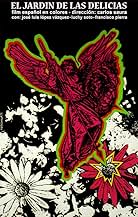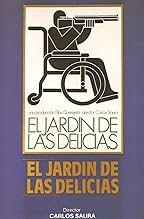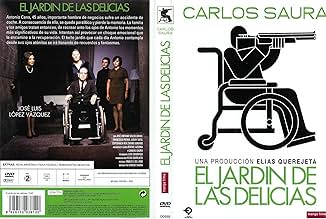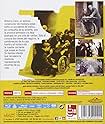NOTE IMDb
6,7/10
787
MA NOTE
Ajouter une intrigue dans votre langueA middle age construction tycoon is wheelchair-bound and amnesiac from a car accident in the company of his mistress. He alone had access to all his business's secrets, including the combina... Tout lireA middle age construction tycoon is wheelchair-bound and amnesiac from a car accident in the company of his mistress. He alone had access to all his business's secrets, including the combination to the safe and his Swiss bank account.A middle age construction tycoon is wheelchair-bound and amnesiac from a car accident in the company of his mistress. He alone had access to all his business's secrets, including the combination to the safe and his Swiss bank account.
- Réalisation
- Scénario
- Casting principal
- Récompenses
- 3 victoires et 1 nomination au total
Antonio Canal
- Ejecutivo
- (as Tony Canal)
Avis à la une
A disturbing mixture of real events, dreams, daydreams, and staged psychodramas, make this a difficult film to follow, let alone enjoy. It seems that the main character, a factory owner, has been paralyzed in a car crash in which his mistress was also injured, and his family attempts to restore him to health by various types of shock therapy. Their motives may be benign yet they are also interested in information that will give them access to Antonio's wealth. But it's not always clear what is happening to whom, nor whose viewpoint we are seeing, nor even if Antonio is recovering. And none of the characters is particularly pleasant, so you might find yourself losing interest in what happens. On the other hand, my confusion may be due to a cultural distance from Spanish surrealism (although the films of Bunuel are among my very favorites!). If you seek a new experience and are well-rested, give it a try, but there is so much more out there.
Tragicomedy with good players but deliberate and rarely developed by Carlos Saura . It deals with the middle-aged Antonio (José Luis López Vázquez), chief of a family corporation who suffered a car accident and has his lost memory and being cared by a nurse (Mayrata O'Wisiedo) while is confined on a wheel chair . He belongs an upper-class family formed by ambitious relatives who attempt to coerce , shock , frighten , as well as elaborating stage recreations of traumas in his infancy into regaining his records and his management powers to find out the key of the safe and the Switzerland Bank account numbers . As Antonio's wife (Luchy Soto, this was her last film until early death , at 51) , parents (Francisco Pierrá) , descendants and relatives (Lina Canalejas) want access to Antonio's money and to keep family control of the enterprise formed by various mean executives (José Nieto , Eduardo Calvo , Luis Peña married to Luchy Soto).
Surreal and disconcerting look at a Francoist family in which includes abstract moments about own memories , illusions , metaphors , symbolism , lies and hallucinations . A surrealistic dark comedy/drama with a lot of metaphoric remarks , dreams , records about childhood , and nightmarish in Luis Buñuel style . As it packs several surrealist scenes , Buñuel-alike , such as the medieval knights , the pig at the mansion , the children battles , when Antonio falls into the swimming pool and many others . During the seventies Carlos Saura shot a trilogy produced by Elias Querejeta about the selfish Spanish bourgeoisie or middle-class formed by ¨Jardín De Las Delicias¨ or "The Garden of Delights" (70) , ¨Ana Y Los Lobos¨ or ¨Anna and the wolves¨ (72) and ¨La Prima Angelica¨ or ¨Cousin Angelica¨ (73) . ¨Jardín De Delicias¨ has a symbolic and thoughtful tone , as the eccentric family represented the peculiar Spain ruled by a dark Franquist period . Written by Saura and the prestigious Rafael Azcona , the greatest screenwriter of the Spannih cinema , who when he worked in ¨La Codorniz¨ magazine was discovered by Marco Ferreri to write ¨El Pisito¨ and ¨El Cochecito¨. Again , Carlos Saura uses a political allegory with his particular characters , outstanding the omnipresent José Luis Vazquez along with other member of this Sui-Generis family . There are certainly many other political elements for those familiarized with the Spanish history , such as : a special recreation of the Republic proclamation April 14 , 1931 ; the Spanish Civil War (36-39) and Antonio/Vázquez , Franco-alike , inaugurating reservoirs , and factories . Very good acting by the great José Luis López Vazquez , he is awesome as the amnesic entrepreneur who can't remember his Swiss bank account numbers , can't lead his board of directors and can't sign documents . Atmospheric score by Luis De Pablo , adding the famous ¨Concert of Aranjuez¨, Sergei Prokofiev music : Alexander Newsky , and opera , traditional ,and popular songs , performed by Imperio Argentina and Jena-Uwe Eggert . Evocative cinematography by Luis Cuadrado , Saura's regular , shot on location in El Escorial and Aranjuez , Madrid .
This dark comedy was well produced by Querejeta and compellingly written/directed by Carlos Saura at his usual style , being dedicated to his wife Geraldine Chaplin who appears briefly . Saura is a good Spanish movies director who goes on nowadays filmmaking . He began working in cinema in 1959 when he filmed ¨Los Golfos ¨(1962) dealing with juvenile delinquency from a sociological point of view . Later on , he made ¨LLanto Por Un Bandido¨ or "Weeping for a Bandit" (1964) starred by an all European-star-cast . Saura is a well recognized filmmaker both nationally and internationally , and in proof of it he won a lot of prizes among which there are the following ones : Silver Bear in Festival of Berlin for ¨Peppermint Frappé¨ (1967) and the successful ¨La Caza¨ (1966) that also won numerous prizes in International Festivals and in which four characters facing each other and terminating into a jarring burst of violence and being full of political allegories . Saura achieved Special Jury Awards in Cannes for ¨La Prima Angélica¨ (1974) , and for ¨Cría Cuervos¨ (1976) . Also, the surrealistic and disconcerting comedy ¨Mamá Cumple Cien Años¨ (1979) got an Oscar nomination in 1979 as the best foreign film , and it also won the Special Jury Award at the San Sebastian Festival . He subsequently made ¨Deprisa , Deprisa¨ based on facts about juvenile delinquency in Spain of the 80s , as he tried to take a position in favour of outcast people and he got to make a both lyric and documentary-style cinema . In 1990 , he won two Goya , The Spanish Oscar , as best adapted screenplay writer and best director . Saura became an expert on Iberian musical adaptations as ¨Carmen¨ , ¨Amor Brujo¨ , ¨Bodas De Sangre¨ , ¨Sevillanas¨ , ¨Iberia¨ , ¨Salome¨ , ¨Fado¨ , ¨Flamenco¨ and even recently Opera as ¨Io , Don Giovanni
Surreal and disconcerting look at a Francoist family in which includes abstract moments about own memories , illusions , metaphors , symbolism , lies and hallucinations . A surrealistic dark comedy/drama with a lot of metaphoric remarks , dreams , records about childhood , and nightmarish in Luis Buñuel style . As it packs several surrealist scenes , Buñuel-alike , such as the medieval knights , the pig at the mansion , the children battles , when Antonio falls into the swimming pool and many others . During the seventies Carlos Saura shot a trilogy produced by Elias Querejeta about the selfish Spanish bourgeoisie or middle-class formed by ¨Jardín De Las Delicias¨ or "The Garden of Delights" (70) , ¨Ana Y Los Lobos¨ or ¨Anna and the wolves¨ (72) and ¨La Prima Angelica¨ or ¨Cousin Angelica¨ (73) . ¨Jardín De Delicias¨ has a symbolic and thoughtful tone , as the eccentric family represented the peculiar Spain ruled by a dark Franquist period . Written by Saura and the prestigious Rafael Azcona , the greatest screenwriter of the Spannih cinema , who when he worked in ¨La Codorniz¨ magazine was discovered by Marco Ferreri to write ¨El Pisito¨ and ¨El Cochecito¨. Again , Carlos Saura uses a political allegory with his particular characters , outstanding the omnipresent José Luis Vazquez along with other member of this Sui-Generis family . There are certainly many other political elements for those familiarized with the Spanish history , such as : a special recreation of the Republic proclamation April 14 , 1931 ; the Spanish Civil War (36-39) and Antonio/Vázquez , Franco-alike , inaugurating reservoirs , and factories . Very good acting by the great José Luis López Vazquez , he is awesome as the amnesic entrepreneur who can't remember his Swiss bank account numbers , can't lead his board of directors and can't sign documents . Atmospheric score by Luis De Pablo , adding the famous ¨Concert of Aranjuez¨, Sergei Prokofiev music : Alexander Newsky , and opera , traditional ,and popular songs , performed by Imperio Argentina and Jena-Uwe Eggert . Evocative cinematography by Luis Cuadrado , Saura's regular , shot on location in El Escorial and Aranjuez , Madrid .
This dark comedy was well produced by Querejeta and compellingly written/directed by Carlos Saura at his usual style , being dedicated to his wife Geraldine Chaplin who appears briefly . Saura is a good Spanish movies director who goes on nowadays filmmaking . He began working in cinema in 1959 when he filmed ¨Los Golfos ¨(1962) dealing with juvenile delinquency from a sociological point of view . Later on , he made ¨LLanto Por Un Bandido¨ or "Weeping for a Bandit" (1964) starred by an all European-star-cast . Saura is a well recognized filmmaker both nationally and internationally , and in proof of it he won a lot of prizes among which there are the following ones : Silver Bear in Festival of Berlin for ¨Peppermint Frappé¨ (1967) and the successful ¨La Caza¨ (1966) that also won numerous prizes in International Festivals and in which four characters facing each other and terminating into a jarring burst of violence and being full of political allegories . Saura achieved Special Jury Awards in Cannes for ¨La Prima Angélica¨ (1974) , and for ¨Cría Cuervos¨ (1976) . Also, the surrealistic and disconcerting comedy ¨Mamá Cumple Cien Años¨ (1979) got an Oscar nomination in 1979 as the best foreign film , and it also won the Special Jury Award at the San Sebastian Festival . He subsequently made ¨Deprisa , Deprisa¨ based on facts about juvenile delinquency in Spain of the 80s , as he tried to take a position in favour of outcast people and he got to make a both lyric and documentary-style cinema . In 1990 , he won two Goya , The Spanish Oscar , as best adapted screenplay writer and best director . Saura became an expert on Iberian musical adaptations as ¨Carmen¨ , ¨Amor Brujo¨ , ¨Bodas De Sangre¨ , ¨Sevillanas¨ , ¨Iberia¨ , ¨Salome¨ , ¨Fado¨ , ¨Flamenco¨ and even recently Opera as ¨Io , Don Giovanni
I really liked this movie. Despite the dull pace. Despite the contemptable characters. Despite the goofy surrealism. Despite the wonky music score. Despite the director's self-indulgence.
In juxtaposition, there are elements of this film that I did not like. Despite the master performance by Mr. Vazquez. Despite the interesting concept. Despite the nifty camera work.
For those who enjoy cerebral film devoid of entertainment, this one's for you. But please, do us all a favor if someone new to subtitled films invites a suggestion of what to watch, don't point them in the direction of this film.
There's a brief reference to Stevens' classic starring Taylor, Clift, and Winters.
Worth one viewing for die hard cinema junkies.
In juxtaposition, there are elements of this film that I did not like. Despite the master performance by Mr. Vazquez. Despite the interesting concept. Despite the nifty camera work.
For those who enjoy cerebral film devoid of entertainment, this one's for you. But please, do us all a favor if someone new to subtitled films invites a suggestion of what to watch, don't point them in the direction of this film.
There's a brief reference to Stevens' classic starring Taylor, Clift, and Winters.
Worth one viewing for die hard cinema junkies.
This film was very dull and uninvolving. Perhaps it is a political allegory, for which I have no interest or understanding. Someone called it a comedy, but I didn't laugh once, nor did I noticed any attempts at humor. Most of the time I didn't know why the characters were saying what they were, if they were lying, who knew what... it was all very unresolved. Who were the man's advisaries? Who were his enemies, why?
At one point the father keeps asking "what's the Swiss bank account number?" Okay, so that shows he's greedy, but it isn't very clever or interesting or dramatic. Everybody in this film is greedy, which ruins the drama.
At one point the father keeps asking "what's the Swiss bank account number?" Okay, so that shows he's greedy, but it isn't very clever or interesting or dramatic. Everybody in this film is greedy, which ruins the drama.
One of the films that Saura made at the beginning of the 70s with evident intellectual airs, artistic will, allegorical content and important political background. These first films by Saura have an undeniable historical importance, being among the first in which the ghosts of the civil war, buried in the 50s after so many films to the greater glory of the national side and the figure of the generalissimo, were resurrected. If the commercial cinema of the 1960s had been decidedly evasive and tried to bury any reference to the past and thus show a desired but false ideological unity in the country, the most critical authors of the regime had to settle for more or less veiled attacks to contemporary reality, but without the slightest allusion to the painful past and the still open wounds.
But with the 1970s, a radical change took place in Spanish cinema, with results as exceptional as Erice's cinema, or as often pedantic as in so many of these Saura films, and almost always with the production of Elías Querejeta, fundamental in this modernization of Spanish cinema.
Now it was also a matter of demonstrating that one was aware of the most advanced, sophisticated and demanding artistic currents of European cinema of the time, but without losing the local touch and focusing on the concerns of the left under Franco's regime; and of course taking advantage of the political context to be able to justify so much affectation when dealing with socially committed and politically militant cinema against the dictatorship.
Many of these films, not necessarily the best ones, became indispensable in film libraries and garnered awards at important European festivals, within a situation that was favorable to them.
Nobody was more belligerent than Saura with some of these films like The Garden of Delights and especially Cousin Angelica.
We must value the visual beauty of these films, which take advantage of Luis Cuadrado's always magnificent photography. It is a cinema that is always interesting, with deliberate planning, formal concerns and clear artistic ambition.
But seen with the perspective of the years and the once the intellectual fury of the time faded, The Garden of Delights seems to be a crude allegory, where the symbol is thrown in the face of the viewer, often without being successfully embodied in a story.
Characteristic is the insistent lack of subtlety in warning us of the allegorical reading of what we see, right from the first scenes with that "You don't understand anything. The important thing is the symbols" that the grandfather shouts. The same lack of subtlety that led the falangist husband in La prima Angélica to have his arm raised in plaster.
Thus, the treatment of the argument often abandons coherence, and takes all the licenses that Saura wants, because the important thing, he has already told us, is the symbol.
At the head of an interesting cast, José Luis López Vázquez, recovered from the commercial comedy of the 1960s, demonstrated during the 1970s his much greater range and interpretive quality. Here he struggles with a difficult role, a poisoned gift, where Saura's lack of interest in developing the story realistically and not allegorically puts him in a compromised position. Like the injured industrialist who is abused by his family with the sole intention of recovering the savings deposited in Switzerland, we do not know very well if he is amnesiac, traumatized, idiotized, or regressed to an infantile state. Its evolution throughout the film is also not convincing, but this again is due to a script that is in no way concerned with the story working on this realistic or functional plane, beyond the mere excuse to disguise the allegorical content. .
Saura seems continually busy feeding critics and analysts from intellectual circles, won over from the start by the film's progressive political positioning, and he shows courage in presenting a speech that could not help but make the authorities uncomfortable.
In short, a film of great historical importance, but that squeaks and annoys the viewer. Its allegorical content inevitably loses virulence and interest once its historical conjuncture has passed. On the other hand, interest in the symbol is difficult to maintain during its almost ninety minutes, and after an hour it gives us a feeling of a certain exhaustion. But I don't think Saura was worried about that, after all his movie wasn't there to entertain the masses...
But with the 1970s, a radical change took place in Spanish cinema, with results as exceptional as Erice's cinema, or as often pedantic as in so many of these Saura films, and almost always with the production of Elías Querejeta, fundamental in this modernization of Spanish cinema.
Now it was also a matter of demonstrating that one was aware of the most advanced, sophisticated and demanding artistic currents of European cinema of the time, but without losing the local touch and focusing on the concerns of the left under Franco's regime; and of course taking advantage of the political context to be able to justify so much affectation when dealing with socially committed and politically militant cinema against the dictatorship.
Many of these films, not necessarily the best ones, became indispensable in film libraries and garnered awards at important European festivals, within a situation that was favorable to them.
Nobody was more belligerent than Saura with some of these films like The Garden of Delights and especially Cousin Angelica.
We must value the visual beauty of these films, which take advantage of Luis Cuadrado's always magnificent photography. It is a cinema that is always interesting, with deliberate planning, formal concerns and clear artistic ambition.
But seen with the perspective of the years and the once the intellectual fury of the time faded, The Garden of Delights seems to be a crude allegory, where the symbol is thrown in the face of the viewer, often without being successfully embodied in a story.
Characteristic is the insistent lack of subtlety in warning us of the allegorical reading of what we see, right from the first scenes with that "You don't understand anything. The important thing is the symbols" that the grandfather shouts. The same lack of subtlety that led the falangist husband in La prima Angélica to have his arm raised in plaster.
Thus, the treatment of the argument often abandons coherence, and takes all the licenses that Saura wants, because the important thing, he has already told us, is the symbol.
At the head of an interesting cast, José Luis López Vázquez, recovered from the commercial comedy of the 1960s, demonstrated during the 1970s his much greater range and interpretive quality. Here he struggles with a difficult role, a poisoned gift, where Saura's lack of interest in developing the story realistically and not allegorically puts him in a compromised position. Like the injured industrialist who is abused by his family with the sole intention of recovering the savings deposited in Switzerland, we do not know very well if he is amnesiac, traumatized, idiotized, or regressed to an infantile state. Its evolution throughout the film is also not convincing, but this again is due to a script that is in no way concerned with the story working on this realistic or functional plane, beyond the mere excuse to disguise the allegorical content. .
Saura seems continually busy feeding critics and analysts from intellectual circles, won over from the start by the film's progressive political positioning, and he shows courage in presenting a speech that could not help but make the authorities uncomfortable.
In short, a film of great historical importance, but that squeaks and annoys the viewer. Its allegorical content inevitably loses virulence and interest once its historical conjuncture has passed. On the other hand, interest in the symbol is difficult to maintain during its almost ninety minutes, and after an hour it gives us a feeling of a certain exhaustion. But I don't think Saura was worried about that, after all his movie wasn't there to entertain the masses...
Le saviez-vous
- AnecdotesThe name is a reference to the Hieronymus Bosch's painting The Garden of Earthly Delights. The work is variably described as "admonition of worldly fleshy indulgence, to a dire warning on the perils of life's temptations, to an evocation of ultimate sexual joy."
- ConnexionsReferences Une place au soleil (1951)
- Bandes originalesConcierto de Aranjuez
Written by Joaquín Rodrigo
Performed on guitar by Ernesto Bitetti
Conducted by José Buenagú
Meilleurs choix
Connectez-vous pour évaluer et suivre la liste de favoris afin de recevoir des recommandations personnalisées
- How long is The Garden of Delights?Alimenté par Alexa
Détails
- Date de sortie
- Pays d’origine
- Site officiel
- Langue
- Aussi connu sous le nom de
- The Garden of Delights
- Lieux de tournage
- La Granjilla de La Fresneda, El Escorial, Madrid, Espagne(Antonio's house and garden)
- Société de production
- Voir plus de crédits d'entreprise sur IMDbPro
Contribuer à cette page
Suggérer une modification ou ajouter du contenu manquant

Lacune principale
By what name was Le jardin des délices (1970) officially released in Canada in English?
Répondre



























